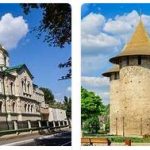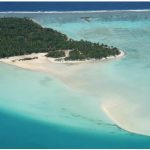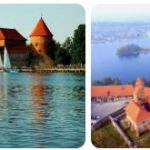Canada Transport and arrival
How do you get to Canada?
Traveling by plane is the fastest from Germany and is also used by the vast majority of travelers.
Canada’s 14 international airports are located in Calgary, Edmonton, Gander, Halifax, Hamilton, London, Ontario, Montréal-Trudeau, Montréal-Mirabel, Ottawa, St. John’s, Saskatoon, Toronto, Vancouver and Winnipeg. The country’s national airline is Air Canada (AC).
The average flight time from Frankfurt am Main is 8 hours to Montréal, 8.5 hours to Toronto and 11 hours to Vancouver. For international flights, a security fee of currently 24 Canadian dollars per ticket is levied at all airports.
Travel in the country
Flight connections
In the country itself, too, flying is a cheap form of transportation due to the sometimes great distances. Around 75 airlines offer flights within Canada. Depending on the distance, the flight times are 0.5 (e.g. Ottawa-Montréal) to 5 hours (e.g. Ottawa-Vancouver). For domestic flights, a security fee of currently 12 Canadian dollars per ticket is levied at all airports.
According to a court ruling issued in November 2008, Canadian airlines must offer heavily overweight passengers two seats for the price of one in domestic traffic. In the opinion of the court, everything else is discrimination.
Railroad
The Canadian rail company VIA Rail Canada cooperates with the American AMTRAK. For this reason, many railways lead to the USA, especially to New York, Chicago, Detroit and Buffalo. The rail network within the country is well developed.
The transcontinental train ” The Canadian” runs three times a week from Toronto to Vancouver via Winnipeg, Saskatoon, Edmonton and Jasper and back. The train consists of 24 carriages with their own kitchen and 3 a la carte meals. At the end of the train there is a viewing car. For the 5,000 km journey, the passenger sleeps and sits in their own compartments.
InterCity trains connect the major cities of Québec, Montréal, Halifax, Toronto, Windsor and Ottawa. The long-distance trains in Canada are considered comfortable and well-equipped (dining cars etc.).
The best way to travel through the Rocky Mountains is by Rocky Mountaineer (from Vancouver to Calgary) or in the luxurious vintage cars of the Royal Canadian Pacific. Throughout the summer (late June to late September) the Polar Bear Express runs almost daily from Toronto via North Bay, Cochrane and Moosonee across Canada’s landscape.
Children under two travel for free, children between two and eleven travel for half the price. A 10% discount is available for travelers over 60 and students. Various Rail Passes allow discounted journeys on certain routes or at certain times (information on this from VIA Rail Canada).
Bus
In addition to the car, the intercity bus is the most common form of transport in Canada. The country has an extensive bus network. The route network of Canada’s largest bus company, the Greyhound Bus Company, alone covers around 193,000 km in North America. Due to the sometimes huge distances, very long travel times have to be planned, e.g. from Ottawa to Montréal around 2 hours, from Ottawa to Vancouver around 60 hours.
People over the age of 65 receive discounts on the fare in some provinces. Special bus passports also allow other travelers discounted journeys at certain times or on certain cross-country routes. Suitable change should be kept ready in city buses, as the driver usually does not give change.
Roads
The car is the most widely used form of transport in Canada. The Trans-Canada-Highway connects the east of the country from St. John’s in the province of Newfoundland and Labrador with the west in Victoria in the province of British Columbia and is the longest road in the world with a little less than 8,000 km. In fact, the highway is a system of highways. The highway has been around for over 20 years with construction costs in excess of $ 1 billion. For ADAC members there is an emergency call center in the USA, which is also responsible for Canada. It offers members and owners of an ADAC international health and accident insurance scheme in an emergency (accommodation, rental car, vehicle or patient repatriation). Further information can be found on the Internet: www.adac.de
Rental
cars Rental cars – including caravans – can be rented at airports and in many larger cities. An international driver’s license must be presented when borrowing. A minimum age of the driver of 21 years, sometimes 25 years, is also required. Payment is by credit card.
Ferry connections
V.a. There are many and mostly inexpensive ferry connections on the west and east coast of the country.
Traffic rules
You drive on the right in Canada. To avoid trouble with the police or even the courts, drivers should strictly adhere to the traffic regulations in force in the country. Regardless of the information given here, it is advisable to obtain more detailed information from the ADAC, the AvD or the Canadian traffic clubs.
Top speeds
- Urban: In built-up areas there is a speed limit of 50 km/h.
- Country roads: There is a speed limit of 80 km/h on country roads.
- There is a speed limit of 100 km/h on motorways and expressways (highways, expressways, thruways, freeways).
In addition, it is of course necessary to pay attention to the current local speed limits, which are indicated by traffic signs. The fines for non-compliance are high.
Special regulations
The traffic regulations largely correspond to those in Germany and Europe. Seat belts are compulsory in Canada. In many provinces you have to drive with low beam during the day. With the exception of some areas of Québec, right turns at red lights are permitted throughout Canada unless otherwise noted. It should be noted that the traffic lights that apply to the respective driver are on the other side of the intersection and not, as in Germany, directly at the stop line. School buses always have right of way. It is prohibited to drive past parked school buses where the hazard warning lights and the “STOP/ARRET” sign are on!
The German driver’s license is allowed for a stay of up to six months in the country.
Blood alcohol limit
The official blood alcohol limit in Canada for drivers of motor vehicles is 0.8 alcohol. This also applies to motorcycle riders. A violation of this limit is punished extremely severely, especially since the consumption of alcohol in public is rather frowned upon in Canada. It is therefore strongly recommended that you refrain from alcohol completely before driving.
International license plate
According to Abbreviationfinder, Canada’s international license plate is:
| CDN |
Entry and exit regulations
eTA approval, visa
With a valid passport, German, Austrian and Swiss citizens can enter the country without a visa for up to six months for vacation, visiting or business purposes. According to Canadian regulations, the passport must be valid until the end of the intended return journey to the home country. Citizens of certain countries, e.g. Turkey or Poland, require a special visitor visa.
Accompanying children must be registered in a parent’s passport. In addition, the German child ID card is recognized as a valid travel document for children under the age of 14. A photo is not required for children, but the Canadian authorities welcome it. Minors traveling alone or with only one parent should carry a certified declaration of consent from their parents or the non-accompanying parent in English or French and a copy of their birth certificate. If the parents are divorced, a copy of the custody ruling is required. In this way, cases of child withdrawal should be excluded.
Tourists are only allowed to enter the country if a return ticket or sufficient financial means are available to secure their return to their home country. In addition, sufficient funds must be proven for the stay in the country.
Since March 2016, travelers need a valid electronic travel authorization (eTA) in addition to their passport. The application must be submitted online.
The procedure is comparable to the ESTA procedure for entering the USA. The application must be submitted in good time before the start of the journey.
Visa and Immigration Department of the Embassy of Canada
Leipziger Str. 17
10117 Berlin
Tel: 0049 – (0) 30 – 20 31 24 47
Issuing of visas in Austria and Switzerland
See under Representations of Canada in Austria and Representations of Canada in Switzerland.
Import and export of foreign currency
- Local currency Means ofpayment in the local currency may be imported without restriction. From a value of 10,000 Canadian $, they must be declared upon entry.
- Foreigncurrencies Foreign currency can be imported without restriction. It must also be declared upon entry from an equivalent value of can $ 10,000.
Departure fee
There is no fee for leaving Canada.
Formalities, visas
Import and export of goods
Non-permanent residents of Canada must declare any firearms, ammunition, or explosives they have brought with them upon entry. Weapons that have not been declared will be confiscated and retained. In addition, criminal prosecution must be expected. Visitors who do not have a Canadian firearms license must also fill out a declaration (“non-resident firearms declaration form”) in triplicate and present it with the firearms when crossing the border. This declaration is valid after processing by Canadian customs officials and the payment of a fee of approximately 50 can $ as a temporary weapons license for a maximum of 60 days, with a free extension possible. Most of the provinces and territories in Canada also have their own regulations governing the carrying of firearms.
It is allowed to take knives with you, with the exception of knives with a spring mechanism. All knives must be declared upon entry.
In addition to clothing and items for personal use, limited quantities of goods can be imported tax-free and duty-free, but they have to be declared upon entry. Gifts with the exception of tobacco, alcoholic beverages and promotional materials with a value of up to 60 can $ per item may be imported duty-free or sent by post to Canada.
Items of personal use can be taken with you duty-free (e.g. fishing tackle, camping and sporting goods, strollers, bicycles, radios, video cameras, musical instruments, laptops). However, they must be declared upon entry and presented to the customs authorities again upon departure.
Food may only be imported for personal consumption. Tobacco can be taken duty-free in the form of up to 50 cigars or cigarillos, 200 cigarettes or 200 grams of pipe tobacco – but only for people older than 16 years. Alcohol may be imported duty-free by persons older than 19 years in the form of 1.1 liters of spirits or wine or 8 liters of beer in bottles or cans. All alcoholic beverages must be declared at customs. The import and export of plants and animals protected under the Washington Species Protection Act is prohibited. A violation of the customs regulations can result in severe penalties.
Travel medicine, vaccinations and warnings
Infectious Diseases
In Canada, the following infectious diseases, which are not or less common in Germany or Central and Northern Europe, are to be expected:
- Schistosomiasis, as a result of tick bites
- Trichinosis, when consuming insufficiently cooked meat from bears, seals or walruses
- Early summer meningo encephalitis, mainly as a result of tick bites
- Fox tapeworm
- Hepatitis A and B
- tetanus
- rabies
- West Nile fever
Recommended vaccinations
when traveling to Canada, the following vaccinations recommended:
- Diphtheria, a vaccination against diphtheria should always exist in your home country
- Hepatitis A and B, a vaccination against hepatitis B, is only required for people who may come into contact with blood or for those who seek sexual contact.
- Polio, polio, a vaccination against polio should always exist, also in the home country
- Tetanus, a vaccination against tetanus should always exist in the home country
- Rabies, but only in high-risk travelers who can come into contact with the vector animals
Vaccination requirements There are no vaccination requirements when entering or staying in the country.
Current warnings
Foreign Office of the Federal Republic of Germany
Citizens’ Service
Tel.: 0049 – (0) 30 – 5000 – 200
https://www.auswaertiges-amt.de/de/aussenpolitik/laender/kanada-node/kanadasicherheit/204874
Canada: Currency, Shopping, and Exchange Rate
The national currency of Canada is the
Canadian dollar (can $) = 100 cents (c).
It is popularly called “Loonie” because the coin depicts a “Loon” (sea bird).
The following banknotes are valid and in circulation in the country:
- 5
- 10
- 20th
- 50
- 100 can $
Exchange rate
A currency converter for converting into other currencies can be found here:
www3.forium.de
Bank opening hours
Most banks in Canada have the following opening hours:
- Monday – Friday: 10 a.m. – 3 p.m.
- Saturday: 10 a.m. – 1 p.m.
- Sunday: closed
Some banks, especially in larger cities such as Montreal or Vancouver, are also open longer (from 9:30 a.m. to 4:30 p.m.).
Shop
Store Hours
Most stores in Canada have the following hours.
- Monday – Wednesday: 9:00 a.m. – 5:30 p.m.
- Thursday and Friday: 9 a.m. – 9 p.m.
- Saturday and Sunday: closed
Smaller shops (especially grocery stores) and many shops in larger cities like Montreal are usually open until late in the evening and sometimes all weekend.
Inexpensive or country-specific goods, souvenirs
Popular souvenirs from Canada are wood carvings (especially Inuit carvings), ceramic objects, cotton articles, tapestries by Arctic textile artists, Inuit jewelry, the famous Nunavut dolls and art prints.
Embassies and consulates
The building of the Canadian embassy in Berlin on Potsdamer Platz was inaugurated in April 2005. Before that, the embassy was temporarily housed in the “International Trade Center” near the Friedrichstrasse train station. The embassy has a special feature in that some parts of the embassy premises are open to the public – including a multimedia room that offers a lot of information on history, culture, politics and business. In addition, a pedestrian passage leads through the building, which connects Leipziger Platz with Ebertstrasse. There is a first-class restaurant in the passage, which is located in the embassy building, but is otherwise independent. Visit Countryaah for a full list of Canada embassies and consulates in each country around the world.
Embassy of Canada in Berlin
Leipziger Platz 17
10117 Berlin
Tel: 0049 – (0) 30 – 20 31 20
Fax: 0049 – (0) 30 – 20 31 25 90
Email: brlin@international.gc.ca
www.kanada-info. de
Consulate Düsseldorf
Benrather Strasse 8
40213 Düsseldorf
Tel: 0049 – (0) 211 – 17 21 70
Fax: 0049 – (0) 211 – 35 91 65
Email: ddorf@international.gc.ca
Consulate in Munich
Tal 29
80331 Munich
Tel: 0049 – (0) 89 – 2 19 95 70
Fax: 0049 – (0) 89 – 21 99 57 57
Email: munic@international.gc.ca
Honorary Consulate in Stuttgart
Langestrasse 51
70174 Stuttgart
Tel: 0049 – (0) 711 – 2 23 96 78
Fax: 0049 – (0) 711 – 2 23 96 79
Email: stuttgart@kanada.de
Embassy of the Federal Republic of Germany in Ottawa
1 Waverley Street
PO Box 379
Ottawa, Ontario K2P OT8
Tel: 001 – 613 – 232 11 01
Email: info@ottawa.diplo.de
www.embassy-worldwide.com/embassy-of-germany-in ottawa-canada
Consulate General of the Federal Republic of Germany in Montreal
1250, Boulevard René-Lévesque Ouest, Suite 4315
Montreal, Quebec H3B 4W8
Tel: 001 – 514 – 931 24 31
001 – 514 – 931 22 77
001 – 514 – 931 75 88
Fax: 001 – 514 – 931 72 39
001 – 514 – 931 53 57
Email: info@montreal.diplo.de
Web: www.montreal.diplo.de
Consulate General of the Federal Republic of Germany in Toronto
2 Bloor Street East, 25th Floor
Toronto, Ontario, M4W 1A8.
Tel: 001 – 416 – 925 28 13
Fax: 001 – 416 – 925 28 18
Email: info@toronto.diplo.de
Web: www.toronto.diplo.de
Consulate General of the Federal Republic of Germany in Vancouver
Suite 704, World Trade Center, 999 Canada Place <
Vancouver, BC
Tel: 001 – 604 – 684 83 77
Fax: 001 – 604 – 684 83 34
Email: info@vancouver.diplo.de
Web: www.vancouver.diplo.de
Additional honorary consulates can be found in: Edmonton, Halifax, Prinve George, Saskatoon, St. John’s and Winnipeg.
Austrian Embassy in Ottawa
445 Wilbrod Street
Ottawa, Ontario K1N 6M7
Tel: 001 – 613 – 789 14 44
Fax: 001 – 613 – 789 34 31
Email: ottawa-ob@bmaa.gv.at
www.aussenministerium.at/ottawa
www. austro.org
The embassy is still responsible for Jamaica.
Honorary Consulate Calgary (without passport authorization)
Demiantschuk Milley Burke & Hoffinger, Barristers and Solicitors, # 1200, 1015 – 4th Street SW
Calgary, AB, T2R, 1J4
Tel: 001 – 403 – 283 65 26
Fax: 001 – 403 – 263 85 29
Email: nick.demiantschuk@legalsolutions.ca
Honorary Consulate General Halifax (non-passport)
1718 Argyle Street, Suite 410
Halifax, NS, B3J 3N6
Tel: 001 – 902 – 429 82 00
Fax: 001 – 902 – 425 05 81
Email: austrianconsulco.ehalifax@sonca
Honorary Consulate General Montreal (with passport)
1350 ouest, rue Sherbrooke, Suite 1110
Montréal, QC H3G 1J1
Tel: 001 – 514 – 845 86 61
Fax: 001 – 514 – 845 93 97
Email: at.cons.mont@qc.aira.com
Honorary Consulate Regina (without passport authorization)
2401 Saskatchewan Drive, Suite 100
Regina, SK S4P 4H9
Tel:001-306- 359 77 77
Fax
: 001-306 – 522 32 99Email: tmerchant@merchantlaw.com
Honorary Consulate General Toronto (without passport authorization)
30 St. Clair Ave.W., Suite 607
Toronto, ON, M4V 3A1
Tel: 001 – 416 – 967 48 67
Fax: 001 – 416 – 967 41 01
Email: consulate.toronto@advantageaustria.org
Honorary Consulate General Vancouver (with passport authority)
1160-595 Howe Street
Vancouver, BC, V6C 2T5
Tel:001-604-68733 38
Fax:001-604-68135 78
Email: austrianconsulatebc@gmail.com
Honorary Consulate Winnipeg (without passport authority)
1001 Sherwin Road
Winnipeg, Manitoba, Canada R3H 0T8
Tel: Fax: 001 – 204 – 833 0103
Email: bjhutchison@bisontransport.com
Canadian Embassy in Vienna
Laurenzerberg 2/III
1010 Vienna
Tel: 0043 – (0) 1 – 531 38 30 00
Fax: 0043 – (0) 1 – 531 38 33 21
Email: vienn@dfait-maeci.gc.ca
www.kanada.at
Swiss Embassy in Ottawa
Embassy of Switzerland
5 Marlborough Avenue
Ottawa, ON, K1N 8E6
Tel: 001 – 613 – 235 18 37
Fax: 001 – 613 – 563 13 94
Email: ott.vertretung@eda.admin.ch
Web: www.eda.admin.ch/canada
Consulate in Calgary
4053 Edgevalley Landing NW
Calgary, AB, T3A 5H5
Canada
Tel: 001 – 403 – 208 32 96
Fax: 001 – 403 – 206 71 57
Email: calgary@honorarvertretung.ch
Consulate Halifax
Consulate of Switzerland
139 Capri Drive
West Porter’s Lake, NS, B3E 1L6
Tel: 001 – 902 – 827 55 48
Fax: 001 – 902 – 827 35 90
Email: halifax@honorarvertretung.ch
Consulate Québec
Consulat de Suisse
2170, Bois-Joli
Sillery, QC, G1T 1E5
Tel: 001 – 418 – 527 37 87
Fax: 001 – 418 – 656 28 17
Email: quebec@honorarvertretung.ch
Consulate General in Toronto
Consulate General of Switzerland
154 University Avenue, Suite 601
Toronto, ON, M5H 3Y9
Tel: 001 – 416 – 593 53 71
Fax: 001 – 416 – 593 50 83
Email: tor.vertretung@eda.admin.ch
Web: www.eda.admin.ch/canada
Consulate General in Vancouver
Consulate General of Switzerland
World Trade Center, 790-999 Canada Place
Vancouver, BC, V6C 3E1
Tel: 001 – 604 – 684 22 31
Fax: 001 – 604 – 684 28 06
Email: van.vertretung@eda.admin.ch
Web: www.eda.admin.ch/canada
Embassy of Canada in Bern
Kirchenfeldstrasse 88, Case postale
3000 Bern 6
Tel: 0041 – (0) 31 – 357 32 00
Fax: 0041 – (0) 31 – 357 32 10
Email: bern@international.gc.c
Web: www. switzerland.gc.ca
Consulate of Canada in Geneva
5, Avenue de l’Ariana
1202 Geneva
Tel: 0041 – (0) 22 – 919 92 00
Fax: 0041 – (0) 22 – 919 92 71
Email: genev-cs @ international.gc.ca








